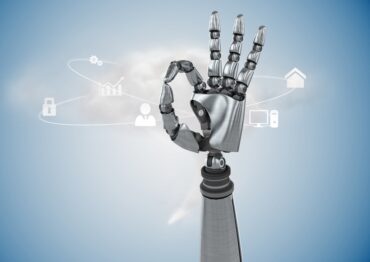
The accounting profession is cited as one likely impacted by AI. However, the role is not facing impending extinction. Rather, AI will usher in a new era where accountants’ roles will be more dynamic.
The concept of introducing automation into the workforce, revived at various points throughout history, always sends ripples of anxiety through the workforce.
Today, ominous headlines suggesting robots might take over the world permeate the news regularly – most recently absolute pandemonium ensued when reports emerged that an artificial intelligence (AI) experiment by Facebook culminated in two chatbots inventing their own language.
It begs the question, though, why is it that change is such a scary concept, leading many to envision a future where evil Ultron-style robots are bent on exterminating humanity, rather than feeling excited about all the potential they could bring?
The simple fact of the matter is that robots will inevitably replace some of our jobs. A recent report from consultancy firm PwC stated that nearly four in 10 (38 percent) jobs in the U.S. could be replaced by automated bots. Yet this isn’t necessarily a bad thing.
Automation isn’t new (and it’s good)
Advances in technology have been evolving humankind since cavemen and rapid advances in technology in the last 100 years have created unimaginable change. Change most of us would agree is for the better. Automation holds significant advantages for humankind as it gives us more time. It is this time that enables opportunity for innovation and rapid growth and gives us the ability to advance.
[ Related: 4 Big Opportunities for AI and Cognitive Startups ]
Prior to the Industrial Revolution, the majority of American people lived in relative poverty, working as farmers and producing the bulk of their own clothing, food and tools. The Industrial Revolution brought improvements including electrification and advances in transportation, which automated a large percentage of farming jobs.
While automation resulted in fewer jobs in the farming industry, it also introduced a whole new array of jobs. Even today many of us are working in fields that didn’t even exist 20 years ago. I for one never foresaw myself as vice president of product and partnerships at a cloud accounting software company when I was in school.
The extinction of the accounting profession at the hands of AI has been a widely circulated topic and, according to a report by the International Bar Association, it is one of the most at-risk industries. However, the accounting industry is merely at an inflection point. It is not facing impending extinction, rather, it’s heading towards a new era where accountants’ roles will be more dynamic.
Automation frees accountants
This new breed of accountants will evolve towards advisory roles, meaning they will need to develop and implement their analytic and strategic abilities. Automation is already transforming the accounting industry, with cloud accounting platforms taking over the more time-consuming aspects of their roles such as data entry. This is providing accountants with more time and the freedom to take on more clients but more importantly, to better inform and advise their clients.
[ Related: How AI Is Dominating Marketing Software: 5 Real-Time Observations ]
As technology takes over more of the mundane, routine facets of accounting, accountants will expand their roles to become virtual CFOs for small businesses. Providing their clients with higher-level services including economic strategy and forecasting, risk management, talent acquisition and controllership duties, they are a valued resource for their clients rather than a commodity.
While cloud accounting platforms can perform the calculations and learn how to best code transactions based on the actions of the accountant, there is a vital human element to accounting that cannot be replaced. Many small business owners think of their accountant as a financial therapist rather than just a number cruncher behind a desk. Accountants moving into advisory roles for small business owners can offer them a wealth of financial knowledge and understanding about their business. Automation will not only provide broader opportunities for accountants, but it will also drive growth in the small business sector.
[ Related: How AI Can Aid the Agriculture Sector ]
Don’t fear the robot
It’s understandable that people are nervous about the prospect of robots taking over their jobs. It seems an insurmountable challenge to compete with efficient, focused robots that neither have to sleep or eat. However, the answer is fairly simple. Robots will never be able to compete with the qualities that make us intrinsically human such as our compassion, creativity, insightfulness and ability to problem solve. Businesses will always require these capabilities and so humans will always play an instrumental role. Their roles will simply shift and expand.
Since the beginning of time change has been inevitable and the advent of robots is no exception. Moving forward, the people and industries who excel will not be the ones burying their heads in the sand but the ones embracing robots and new technologies wholeheartedly.






























